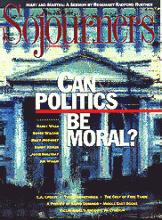Susan Faludi, a Wall Street Journal reporter, compellingly documents the argument that gains for women in the '70s provoked a misogynist backlash that forms the core of New Right efforts to resurrect "an outmoded or imagined" social order. Such "backlashes have surfaced with striking frequency and intensity," whenever women have made "mostly tiny gains" toward greater equality, freedom, and well-being.
In 15th-century Europe, Heinrich Kramer and James Sprenger published 30 editions of the Malleus Maleficarum, a treatise on witches and their craft. Montague Summers, translator and editor of the 1928 and 1948 editions, called it "among the most important, wisest, and weightiest books of the world." Witches, he said, conspired to achieve "the abolition of monarchy, the abolition of private property and...inheritance, the abolition of marriage, the abolition of order, the total abolition of all religion." The Malleus decrees that "far more women are witches than men....If we inquire, we find that nearly all the kingdoms of the world have been overthrown by women."
Faludi speaks only of American women, of whom ancient fears and hatred find new expression in the "clear ideological agenda" of the late 20th-century American reactionary right. The leaders of the ideological right "were among the first to articulate the central argument of the backlash - that women's equality is responsible for women's unhappiness."
Read the Full Article

